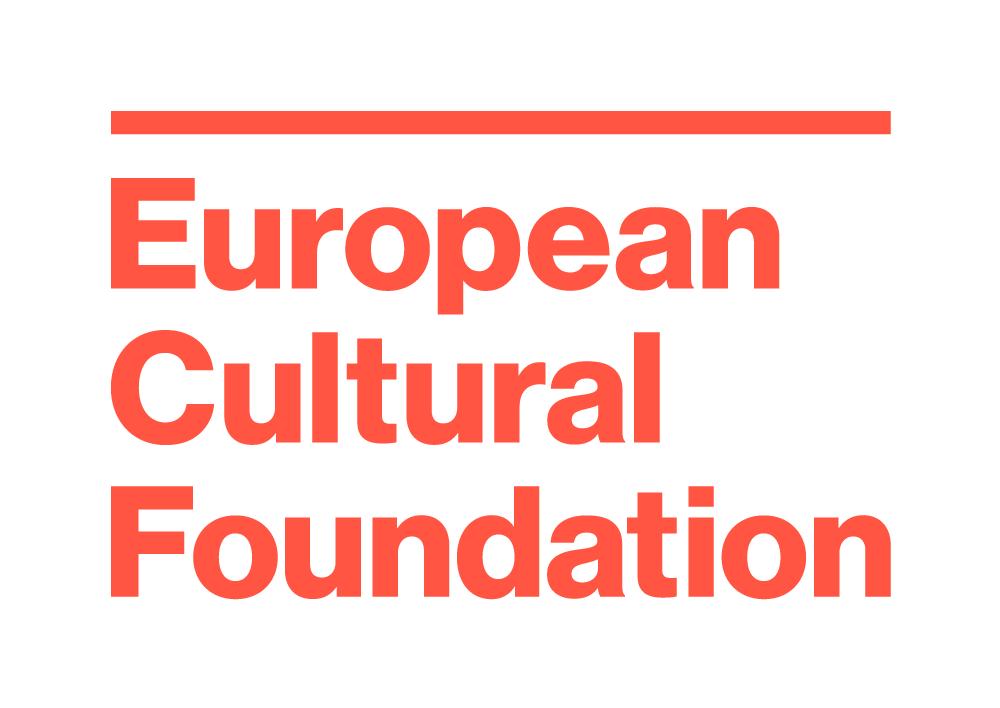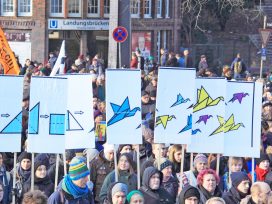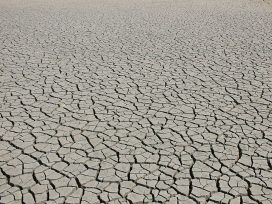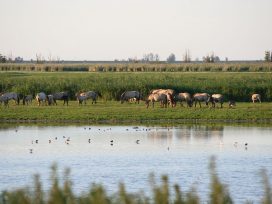Intensifying the exploitation of underground resources has been suggested as a solution for Europe’s crisis-ridden regions. But who really owns these resources? And where do the proceeds from their exploitation go? Evie Papada reviews the situation in the villages of Chalkidiki, Greece.
The Skouries forest in Chalkidiki has been at the centre of a hotly contested dispute between the mining company Hellas Gold, a subsidiary of the Canadian mining giant Eldorado Gold, and local communities. The company claims that an ambitious plan for mining gold and copper in the area – involving deforestation, open pit mining and the everyday use of explosives – will benefit the region through the creation of some 5000 direct and indirect jobs. Local residents, on the other hand, argue that the planned investment will cause considerable damage to the environment and livelihoods, resulting in many more job losses in existing sectors of the local economy (farming, fisheries, beekeeping, food processing and tourism). The residents’ claims are further supported by research that various independent scientific institutions have conducted, such as the Aristotle University of Thessaloniki and the Technical Chamber of Macedonia. In addition to questions of legitimacy raised by the transfer of mining rights from the Greek state to the aforementioned company, the Environmental Impact Assessment that Eldorado produced has been found to contain gross methodological discrepancies, whilst the public consultation process has been described as cosmetic.
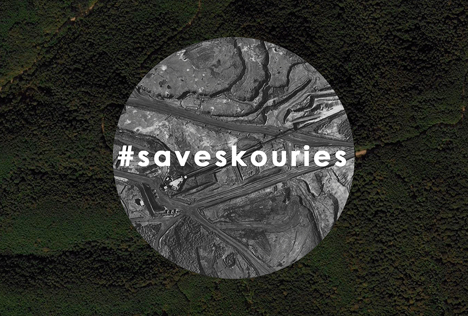
Photo: Joseph Kesisoglou. Source:Flickr
Mining conflicts feature prominently in the global conflict landscape. Typically, they arise as a result of complaints concerning water and soil pollution, illegal land occupation and transport and waste disposal issues. Local communities surrounding the Skouries forest in Chalkidiki had mobilized against the expansion of mining activities long before Eldorado was given the green light to begin works in the region. Small-scale mining continued almost without interruption since the end of World War II and residents have already experienced its impact on their livelihoods and the environment. During the 1990s, the Greek government made several attempts to revive mining activity in the region but, following an appeal by residents, the State Council decided that the potential risks of the proposed investment were higher than the potential benefits for the community and the environment. Operations came to a halt in 2002.
Adding to the contentious issues hovering over livelihoods and the environment, the case of mining in Chalkidiki took on a pronounced political dimension in December 2003. This followed the Greek parliament’s ratification of a law allowing the transfer of the mines from their previous private owner to the Greek state for 11 million euros. However, the mines were sold the same day, for the same price, to George Bololas, owner of Hellas Gold. Since there was no open procurement process, the transaction breached European Union legislation. The concessions granted relieve the company of any tax transfers and from any financial obligation concerning environmental damage resulting from the previous operation of the mines. It also stipulates that the mining company has possession of all minerals – there are to be no royalties for the state.
The European Commission deems the terms of the contract as amounting to illegal state aid in favour of the company and has ruled that the Greek government should pay a fine of 15.3 million euros, plus interest. In addition, the European Court of Justice deems the Environmental Impact Assessment (EIA) produced by the company to be in adequate, for having failed to meet the requirements laid out in the Framework Directive 60/2000/EK regarding Community action in water policy. The Directive indicates that mining activity can be sustainable only if it does not alter the character of a region, and developmental if it is carried out in the overall interest of society. The Greek government has appealed the decision and the case is still pending. Despite the court decision and strong criticism, the EIA was finally approved and in March 2012, 4.1 square kilometres of public forest were put aside for the company to begin the implementation of the mining projects.
Understanding mining conflicts
Issues concerning the distribution of extracted resources and the level of recognition given to communities’ relationship to natural resources are at stake here, as well as the meaningful participation of communities in decision-making processes. These are the kinds of issues that may contribute to a sense of injustice, or environmental injustice, when it comes to mining conflicts. In political ecology, community mobilizations can thus be understood as a response to a series of disruptions in the course of “procedural justice”. Over the years, local village communities’ responses have been manifested in the setting up of local committees and meetings in homes. Information seminars have been organized and the wider scientific community of northern Greece successfully engaged and mobilized in attempts to collect data and exert pressure against the expansion of mining in the region. In other words, a space was created where communities and individuals live and develop political strategies. The history of their struggle is eloquently captured in a documentary entitled Golden Times: Cassandra’s Treasure, released in 2012. It is a rare in-depth investigation of the resistance movement in Skouries: rich in oral history, imagery and personal accounts, following the historical responses of communities to multiple instances of procedural injustice.
Alongside issues of procedural justice, the language of values and valuation used by the different actors involved in environmental conflict can play a significant role in how the conflict emerges into the public sphere. For example, the impact on the surrounding environment and on livelihoods may be evaluated in physical or monetary terms, or represent “strong” as opposed to “weak” sustainability.
For the residents of Chalkidiki, collective memory of village life, the loss of livelihoods and the prospects for coming generations all imply values that surpass monetary valuations. Such incommensurable values pertaining to mining conflicts are reflected in the concept of “ecological distribution conflicts”. At the same time, the dynamics of power carried in the prevailing language of such valuations may have significant consequences for how the conflict is negotiated in the public sphere. In the case of mining in Skouries, dominant representations by key government and media outlets that present investment in mining as beneficial and opposition as criminal have overshadowed both scientific and community valuations.
A golden opportunity for growth
Regional competition for resources and pressure to curb high unemployment rates are driving a gradual shift in European attitudes and policies towards mining. In an online article published by Reuters on 4 July 2013, entitled “Mining revival offers hope in crisis hit Europe”, an analyst from Raw Materials Group explains that growing resource nationalism in many parts of the world makes Europe more attractive from a political risk perspective. Canadian investors clearly encountered no resource nationalism when they knocked on Greece’s door; and the concessions granted (full possession and no royalties for the state) were enabled by a law that dates back to the Greek military junta.
Since 2009, Greece has been operating under the auspices of the financial recovery plan designed by the IMF, European Central Bank and the European Commission. According to the signed Memorandum, the country has agreed to a multi-billion euro bailout on the condition that it implements structural adjustment programmes and attracts investment, supposedly the only strategy that can lead to growth and job creation. Given the pressures to attract foreign direct investment inherent in any IMF structural adjustment programme, it comes as no surprise that the Greek government approved the questionable terms of the Environmental Impact Assessment. The paradox however remains: the terms of the concessions made to the company leave little room for the Greek state to profit from this investment. The scale of environmental damage and the circumstances under which this project has been licensed bears a striking resemblance to many post-colonial modernization projects, widespread in the developing world.
It is not the first time that the economic crisis has been used as a pretext for sacrificing the environment and basic rights. The then minister of finance was so eager to approve the Environmental Impact Assessment and sign the investment agreement with Hellas Gold, and so determined to follow through on the agreement, that practically no one could stand in his way. Certainly not protesting local residents, who were soon to be accused of forming and participating in a terrorist organization.
The turning point came on 21 October 2012, when about 2500 protesters fought a pitched battle with more than 200 police along the forest road leading to Eldorado’s Skouries gold and copper deposit. Fourteen people were arrested. On the night of 16 February, about 40 masked men invaded a Skouries work site in the forest, set fire to machinery and vehicles, and doused three security guards with fuel, threatening to burn them alive. Eldorado valued the damage caused by the arson attack at one million US dollars. Two men were arrested and another 18 are under investigation.
Evoking concerns over terrorist activity and the threat to social order, police forces imposed a regime of occupation in the village of Ierissos, conducting continuous house searches, interrogations and arrests. This included 16 DNA samples taken by force and without consent, as well as arbitrary detentions – the residents of Ierissos and neighbouring areas were confronted with an Orwellian reality. A 76-year-old women was called to testify at the local police station, having been accused of the “use of illegal violence” while participating in the demonstration in June 2013, during which the road leading to the worksite in Skouries was blockaded. Thirty-five local residents are facing identical charges, for protests and blockades in April 2013. Moreover, the National Federation of Editors Union released a statement condemning the surveillance activities of the National Intelligence Service and the secret recording of conversations involving national and international media regarding events in Skouries.
The local mobilization and unprecedented repression that ensued quickly found an international platform for support and solidarity through social and critical media platforms. The “battlefield” ceased to be the central stage for mobilization and the resistance welcomed new actors. More hybrid forms of resistance emerged. Local, national and global protests continued alongside international advocacy and lobbying. Consequently, the police presence has gradually declined. Instead, the North Star ascended, a private security firm that stepped in to guard the site and equipment. On 16 December 2013, 150 employees of the same security firm were fired. Thereafter, they came to protest in the village square of Stratoni. Meanwhile, Eldorado Gold switched security providers and went over to Blackwater, notorious for its involvement in the Iraq and Afghanistan wars. In response to which, protesters carried a placard inscribed with the slogan “Murderers of nations, get out of here”.
The local community strikes back
In advance of the local elections in May 2014, over 3000 voters from five villages in the Aristotelis municipality, under the slogan “An initiative of unity”, organized a secret ballot for the purposes of selecting candidates, all active members in the movement against mining in the region, who would eventually represent the anti-mining block in the local elections. This is an example of where autonomous agency meets with the liberal paradigm and creates what Oliver Richmond refers to as places of hybridity. In this place of hybridity, the communities of the Aristotelis municipality of Chalkidiki defend their historical ties to the region and remained defiant against the multiple assaults on livelihoods and the environment, combining direct democracy with the conventional electoral avenues offered by the municipal elections. The electoral result was another vindication for the communities who saw their candidates capturing the majority of the votes. It is among the first stories of political emancipation on such a scale in crisis-hit Greece.
The liberal peace project of modern Greece, designed to heal the societal wounds caused by the civil war and military junta, has failed. It is beyond the scope of this article to analyse the ensuing democratic deficit, however rampant police violence and arbitrary arrests are reported on an almost daily basis by the few media outlets to have survived the angry grip of the establishment. All of these incidents, coupled with the prohibition of assembly on major streets, the marshalling of state employees, neo-Nazi resurgence and the corruption at the heart of the very institutions supposed to guarantee democratic and transparent processes point to a fragile post-1974 social and political consensus. The terms for a new social contract will have to be renegotiated yet again as the country struggles to cope with the social and financial wreckage of austerity. The events in Skouries are but one example of how state and media power ruptures the everyday lives of people.
The presence of the mining company and the scale of its activities constitute a challenge to customary forms of community-organizing and local state institutions. Local authority representatives are divided between those who support the project and sign agreements with the company and those who oppose it and join the resistance network. Land disputes and environmental hazards pose a threat to traditional forms of employment such as farming and fishing. Different forms of popular mobilization against the mining giant, as well as the decision as to whether to opt for employment in the mines, present a challenge to the main pillars of village communities, traditionally based on family and work relations. Institutional power has revealed itself as ideology, having previously been exercised behind the mask of growth. The local struggle to safeguard the environment against the activities of Eldorado is transfused with the struggle against an ideology that places the doctrine of “growth at whatever cost” at the centre of the new financial dogma imposed on debt-ridden Greece.
Introducing new players
The dynamic of the resistance movement in Skouries is continuously fuelled by the intensification of mining activities and deepening economic crisis. In effect, the debate is polarized between those who welcome the potential for employment creation as a result of investment and those who firmly oppose it on grounds of its ecological footprint and political short-sightedness. In this light, the answer to the question of what is an acceptable human and environmental cost of foreign direct investment is admittedly political.
The newly elected Syriza government, through its energy minister Panagiotis Lafazanis, has publicly stated its opposition to gold mining in Skouries and announced its decision to re-examine the legality of Eldorado’s plans for the construction of a processing plant and of two dams for the creation of waste pools, for which the trees have already been felled. Mounting pressure against this move came initially from Eldorado’s CEO, who insisted on the financial benefits of the investment, followed by interventions by Canadian diplomatic sources. The association of forest workers in the region went on strike and demonstrated in Athens, demanding the continuation of the planned works, claiming that discontinuation will incur job losses. In addition, on 1 March 2015, the three-member Council of Judges of the Misdemeanour Court of Chalkidiki issued an indictment relating to the Skouries case. As a result of which, twenty-one individuals are to appear in the Felony Appeal Court of Thessaloniki – all facing heavy charges, including the formation of a criminal organization, attempted manslaughter and robbery.1 According to representatives of the local communities, the timing of the announcement of this indictment impacts directly on the social and political climate, raising questions about the implications it will have when the legality of Eldorado’s operations is put under official scrutiny.
The stakes are high for all parties involved. As it stands, Eldorado is defending a multimillion-euro investment project, offering a scarce source of employment in a region suffering from high unemployment rates. For the Syriza government, which came to power promising to show no tolerance towards illicit interests regarding foreign direct investments and the auctioning of national assets, a potentially incriminating outcome to the current legal process may prove to be double-edged sword. If investment activities come to a halt, a robust and environmentally sound development plan for the region must be promptly put in place, so as to fill the void that will inevitably be created in terms of job losses and regional growth expectations for both supporters and opponents of the investment project. As for the local and national resistance movement, the current legal re-examination process is the culmination of years of intense opposition to this high-impact mining activity and a political recognition of their struggle.
References
A. Kontogianni, D. Damigos, C. Tourkolias, M. Skourtos (2012) “The social cost of mining: The case of gold mining in Chalkidiki”. Presented at the 3rd International Conference of Industrial and Hazardous Waste Management, Crete.
Grey Steven, Kyriakidou Dina, “Greece’s triangle of power”, Reuters, 17 December 2012, www.reuters.com/article/2012/12/17/us-greece-media-idUSBRE8BG0CF20121217
J. Martinez-Alier (2001) J. Martinez-Alier (2001) “Mining conflicts, environmental justice, and valuation”, Journal of Hazardous Material 86, nos. 1-3
Oliver Richmond (2010) “Resistance and the post-liberal peace”, Millenium Journal 38, no. 3
SOS Halkidiki Factsheet. Available at: soshalkidiki.files.wordpress.com/2013/02/soshalkidiki_01_el_sp.pdf
Michael J. Watts (2004) “Antinomies of community: Some thoughts on geography, resources and empire”, Transactions of the Institute of British Geographers, New Series, 29, no. 2
Published 2 April 2015
Original in Swedish
First published by Ord&Bild 5/2014 (Swedish version); Eurozine (English version)
Contributed by Ord&Bild © Evie Papada / Ord&Bild / Eurozine
PDF/PRINTPublished in
In collaboration with
In focal points
Newsletter
Subscribe to know what’s worth thinking about.
Related Articles

On making commons concrete
The Dutch Review of Books 2/2021
‘The Dutch Review of Books’ presents: the commons, vying for legitimacy between state and capitalism; the void of societal responsibility for #MeToo; and African oral traditions evident in rap music.
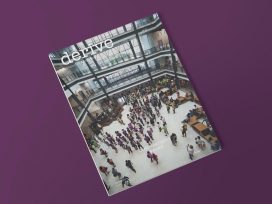
Democratic ‘Third Places’
dérive 10–12/2020
Urbanist magazine ‘dérive’ on emancipating Brazilian museology; the potential for Polish cultural centres; Swiss commons as a transferable prototype; and post-explosion Beirut.
